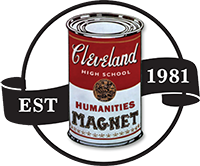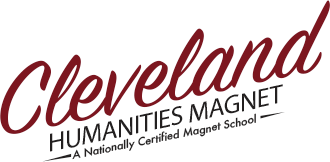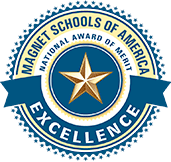Why Choose Cleveland Magnet?
A Parent’s Perspective
With almost two years as a Cleveland Humanities Magnet High School (CHMHS) parent under my belt, and the hope that my now 8th grade son will soon be off the waiting list and on to the admitted list for next fall, I hope this perspective will help you in your quest for the high school program that best fits your child’s needs.
Choose Cleveland because you want an excellent public school educational experience for your child. Comparing private high schools with even the best LAUSD public schools is like comparing apples and oranges and, frankly, is unfair to the public school. At CHMHS, students enjoy the small learning community of an 841 student (maximum) program, within the larger residential, traditional high school campus. Magnet students share classes such as Math, Foreign Language, Electives and P.E. with non-magnet students and are exposed to a broad range of students from many socio-economic, racial and ethnic backgrounds, both in magnet (aka ‘Core’) and non-magnet classes. They also enjoy participating in and supporting a myriad of sports teams, clubs (more than 50 – see the attached list of approved clubs), band, cheerleading, yearbook staff, service organizations, leadership and more. CHMHS offers students the opportunity for a unique magnet program along with the many experiences available for students found in a traditional high school setting. This combination fosters a student community of tolerance, acceptance and understanding, and provides students with the best of both worlds.
Choose CHMHS because you want a rigorous, college preparatory program for your child with the objective of teaching students to study and to think critically and analytically about History, Philosophy, Art and Literature while developing and demonstrating the ability to clearly, logically and intelligently express their own views. The program incorporates a grade level based thematic, interdisciplinary, writing-based approach to learning with a focus on the Humanities. Depending on grade level, most classes include multiple disciplines and teachers. Every 10 weeks students write an in-class two-hour essay known as the Interdisciplinary Unit Exams (IUE). The IUE combines the material from all Core classes and serves as the cornerstone of the program. Final semester grades for Core classes are an average of the grades in each of the disciplines plus the grade on the mid-term IUE and final IUE.
Choose CHMHS because you want a program taught by dedicated, creative, “out of the box’ thinking teachers, many who are CHMHS graduates themselves. Because of the interdisciplinary approach to learning, our teachers cross traditional departmental lines, working as a team to develop curriculum, grade exams, create the vision and mission of the program. The teachers are accessible and responsive, most via email. and in-person during dedicated school events (Back to School Night, Open House) and by appointment. CHMHS faculty attend an annual year-end retreat to evaluate and analyze the successes and failures of the previous school year, ensuring ongoing evaluation, innovation and improvement for the program. Recent teacher-initiated programs include a film approach to the humanities and programs in aesthetics (the study of art, beauty and the experience of each) and semantics (focusing on the meanings of words and their relationship to reality). In December 2009, CHMHS teachers led a student tour to China and in 2010 a group of graduates will travel with teachers throughout Europe for 15 days.
After two years I see consistent academic growth in my son. At the completion of middle school, I had concerns about his ability to compose a well thought, well written, intelligent and logical essay. Composing college entrance essays was just 3 ½ years away, soon to be followed by college essay exams. I worried that he didn’t possess the time management skills and discipline to succeed in such a rigorous program. As he approaches the end of his sophomore year, I see almost daily examples of his newly learned skills and capacity to think, analyze and write a properly structured and thoughtful essay on almost any subject. In museums, during family travels, on TV and even in video games, he recognizes references to things learned in Art History, Literature, Philosophy and Architecture. Socially, he has made many new friends and participates in clubs and sports. I see him maturing into a hard working, goal oriented young man who has a good head on his shoulders. While he clearly thrives in the Cleveland Humanities environment, the curriculum requires hard work and discipline. He might have earned higher grades at a less demanding high school, but the breadth of knowledge and experience he has acquired cannot be measured simply by letter grades.


